
Survey & Commentary on Irresistible: Reclaiming The New That Jesus Unleashed For The World by Andy Stanley
“Why doesn’t everyone in American go to church?”
That was the question pastor Andy Stanley received on a trip to China from a local Christian woman. At the time, he didn’t have a satisfactory answer, but it began a journey back to the roots of Christianity and its centerpiece. According to Stanley now, the main reason for the decline in the American church is how resistible it has become.
Ironically, it would be an irresistible message, ethic, and ultimately a historic event that would transform the world and turn the very empire that crucified Jesus into a vehicle for spreading the great news about Him. And this story is the one Andy unpacks for us in his book, Irresistible: Reclaiming the NEW that Jesus Unleashed For The World (affiliate link).
Irresistible Book Commentary
After finally concluding my second book commentary, I’m now shifting my attention to sharing and discussing Andy’s new deep dive into the origin of Christianity, and it's primary directives.
If you're interested in reading along, you can grab your copy on Amazon here (affiliate link). If you’d like to participate in the discussion, make sure to connect with me on Facebook and follow this hashtag, #IrresistibleTalk.
As I share passages and my commentary, I’ll post them below on this page, so be sure to bookmark it, and come back for interactive insights over the next several months.
Section 1: Simply Resistible, Introduction
"Why doesn't everyone in America go to church?"
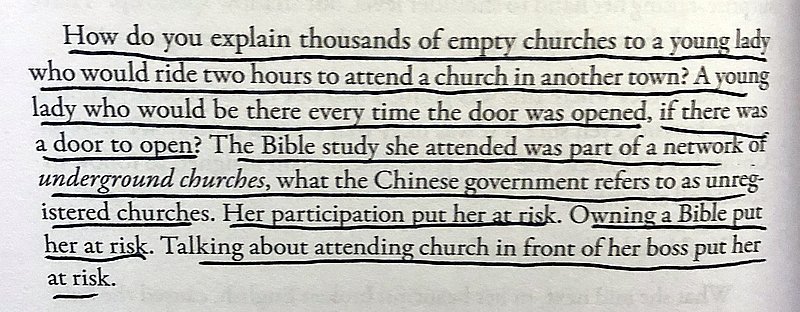
“I always thought the most powerful weapon in the world was the bomb. I have changed my mind. The most powerful weapon in the world is not the bomb. It is the truth." - Andrei Sakharov
Why are we not compelled by the most important truth there is? People are desperate to learn and share the story of Jesus' resurrection globally, but in America, with all our resources, we're struggling to catch up with the bold global efforts that lack our resources.
Is it apathy? Rejection? Doubt? Something else?
How would you answer the question, why doesn't everyone in America go to church?
Because we've not experienced an irresistible church, we've become distracted by other things, we've been hurt by the church, or we're simply not currently engaged with an irresistible church. That's been my experience.
Fortunately for me, I've grown up in the church, in the Christ-oriented sense of His people, & His movement. My parents modeled and shared the life of Jesus, we attended several different church locations, and my extended family and community were mostly Jesus focused, and fruit-bearing (and I benefitted greatly). Christianity was irresistible and I wanted to attend, to share, and invite others to join in.
When I left Arizona and moved to Atlanta, I had to take ownership (it took some time) of my relationship to others following Jesus (The Church). We did this somewhat with the first church we attended, but we soon faded in our involvement. After a few years, Cait pushed for us to attend another church in the area we lived. Compliant, I went along (hey, I was busy building the business!). It was a positive experience that shifted me from a passive attendee to a committed participant. While my relationship with Jesus continued through all seasons, my relationship with the church had a different wavering trajectory.
What about you?
Chapter 1: The New Standard American Version
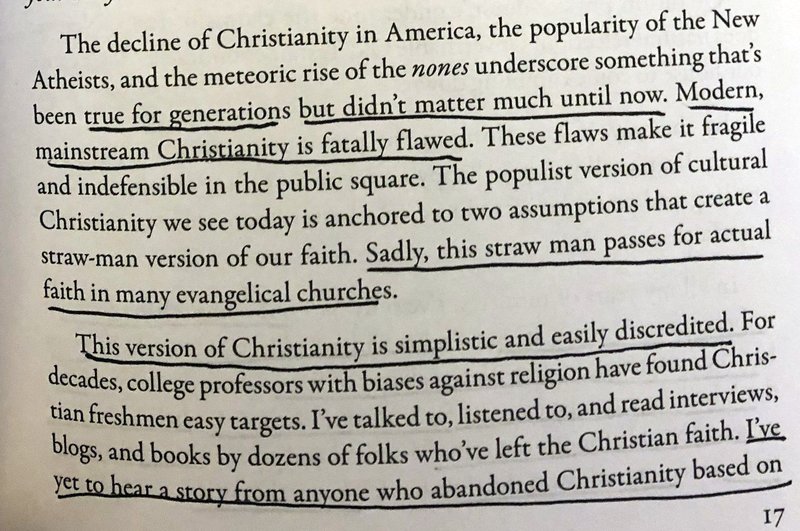
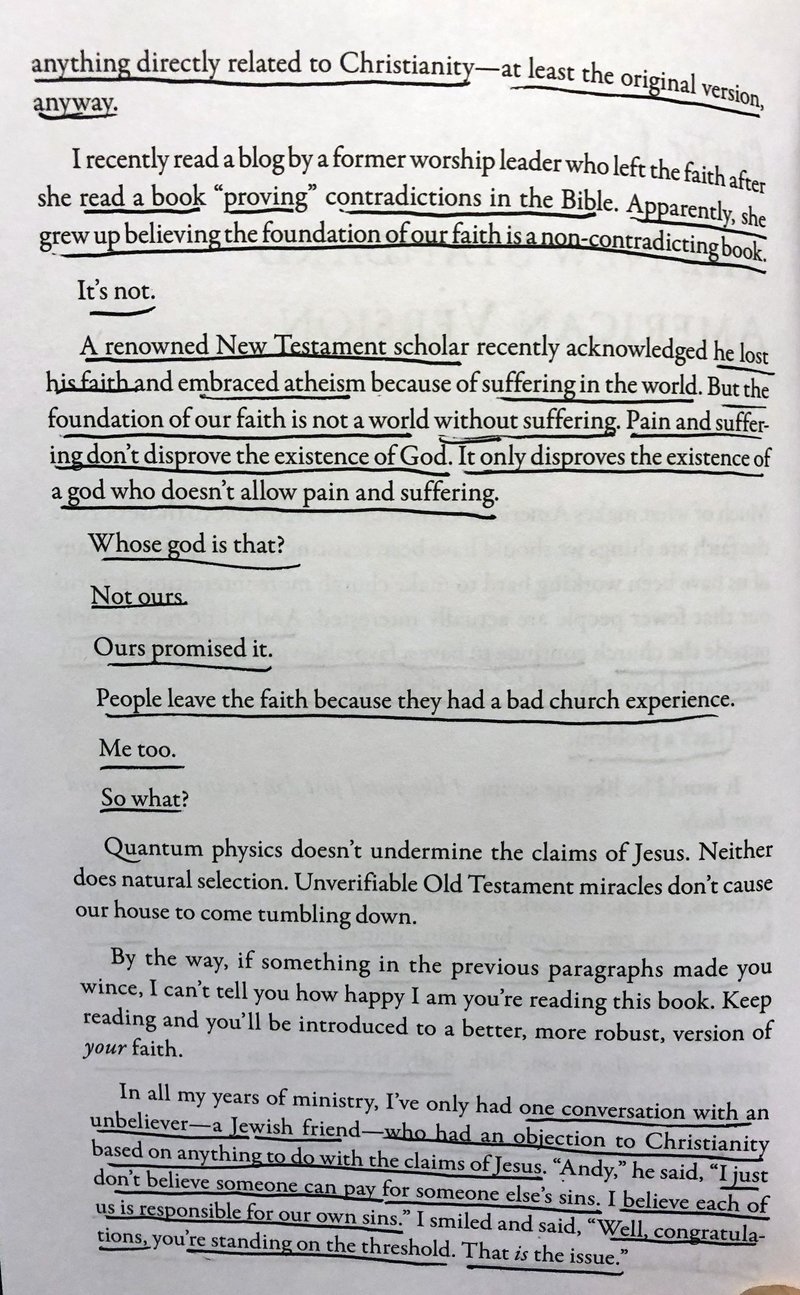
Do you know someone who has walked away from following Jesus, unnecessarily? These questions will help you discover an answer.
Does Christianity rest on a Bible without contradiction? A world without suffering? Church involvement without pain? Problematic scientific discoveries? Unexplained old testament miracles or violence? Did you or a friend walk away for this reason, or was the reason actually centralized around Jesus?
And lastly, are you perpetuating a flawed form of Christianity (as a believer or unbeliever)?
Yeah, I've had conversations where I've agreed with the concerns brought up or witnessed a misunderstanding from those struggling with faith or walking away from it (or to it).
If they knew what I knew, would it change how they saw it? If they experienced what I have, would it alter their paradigm?
For the most part, I understood throughout my life, the foundation of my beliefs was through my relationship with Jesus (although still somewhat ambiguous). While this didn't alleviate the tensions found in the other issues mentioned above, it did give me an anchor point to wade through these questions. Others without this simply drifted away from the currents they found themselves in.
Unfortunately, because I lacked deep clarity of knowing the foundation of Christianity, the role of the Bible, and the negative experiences of life, I've definitely been distracted by highly emotional challenges. Having a sense of defense for these things may be appropriate at times, but many times, they simply become distracting. The starting point of the discussion and order of it matter.
It's quite powerful now, to live with my hands open on all of these different issues and possibilities of explanation. I can rest in the vast unknown, knowing what matters most is known. As Stanley states in the excerpt, there is a form of Christianity, the original form, that is rock solid and stands the test of time, and the scrutiny of critical thought.
The Way Forward
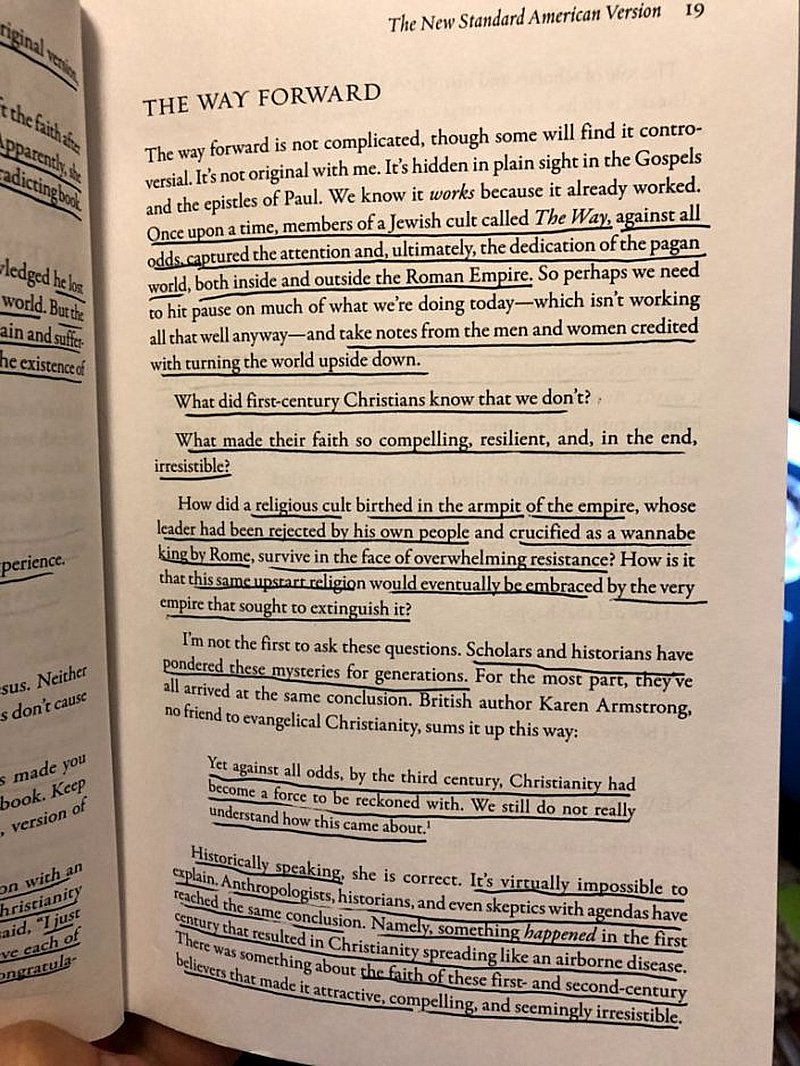
The origin story of Christianity is astonishing. Ironically, an event in history would transform a powerful empire that crucified a man and his followers to become an ally of it (all without force). How do you explain a group that should have been quickly extinguished spreading like wildfire? And not just what happened, but also the stories of the people involved?
It turns out, other than the simplest explanation (what is said to have happened actually did happened), there isn't a satisfactory answer for understanding how.
What do you think? Did something happen? What's the best explanation you've found for the origin and rise of Christianity?
Jordan Peterson shares the following in his book 12 Rules For Life: An Antidote to Chaos (affiliate link) to further the point made above...
"The society produced by Christianity was far less barbaric than the pagan—even the Roman—ones it replaced. Christian society at least recognized that feeding slaves to ravenous lions for the entertainment of the populace was wrong, even if many barbaric practices still existed. It objected to infanticide, to prostitution, and to the principle that might means right. It insisted that women were as valuable as men (even though we are still working out how to manifest that insistence politically). It demanded that even a society’s enemies be regarded as human. Finally, it separated church from state, so that all-too-human emperors could no longer claim the veneration due to gods. All of this was asking the impossible: but it happened"
Andy Stanley dives into the historical significance of the Church origins, and our place in that story in his message Inconceivable in the following video.
A few years back I was discussing with a former Atheist, now Christian, about his conversion experience. What was it that changed his mind? How did he come to follow Jesus?
The first of his two reasons, was the historical case for Jesus' life, death, and resurrection. He had never done a deep dive and was compelled by the abundance of strong evidence that what happened actually did. He realized it wasn't just reasonable to conclude it happened, but it was actually compelling.
As far as the second reason goes, it was the preaching of Andy Stanley. He continually wanted to argue with him but found himself perpetually agreeing with Stanley's sound well-communicated evidence-based arguments.
Chapter 2, 3, & 4: Going Global, Temple Tantrum, & Splittin' Up
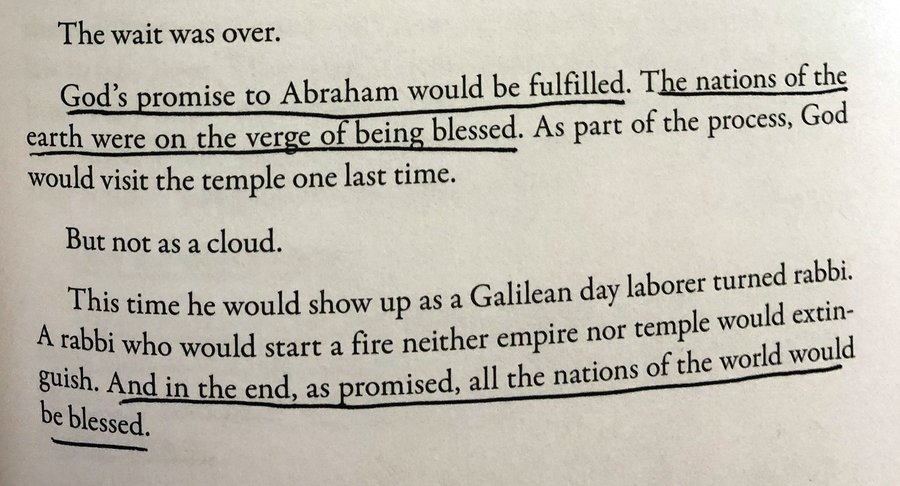
God made a promise to a man (all people on Earth would be blessed through Abraham), established a contract and innovative personalized law for a unique nation, and He set the stage for a world-changing event as entered as a human.
And regardless of whether you choose to accept the evidence of what happened, there's little justification for not recognizing how much of an impact Jesus would have on the nation or Israel, the Roman Empire, and the world today.
I'm particularly curious about the impact of Christianity on the world. The following positive examples demonstrate the impact of Jesus arriving on the scene (we can discuss the level of impact which varies).
- The intrinsic worth of human life, thus ending or minimizing human sacrifice, slavery, infanticide, and polygamy.
- Schooling, Universities, & Hospitals. The development of modern science, and the contribution of numerous Christian scientists.
- Sharing the love ethic of Jesus and promoting virtue in a variety of contexts.
- The promotion and encouragement of marriage, a sexual ethic, and family.
- The Gregorian calendar and many of our holidays like Christmas & Easter are centralized around the life of Jesus.
If we removed the entire Christian history and ethics from our society and world, there would be little to justify much of the wonderful values, systems, laws, and cultural influences that allow us to flourish and liberate those struggling.
The world is standing on the shoulders of giants. And the biggest of which is the shoulders of God.
Chapter 5: Recentering The Universe
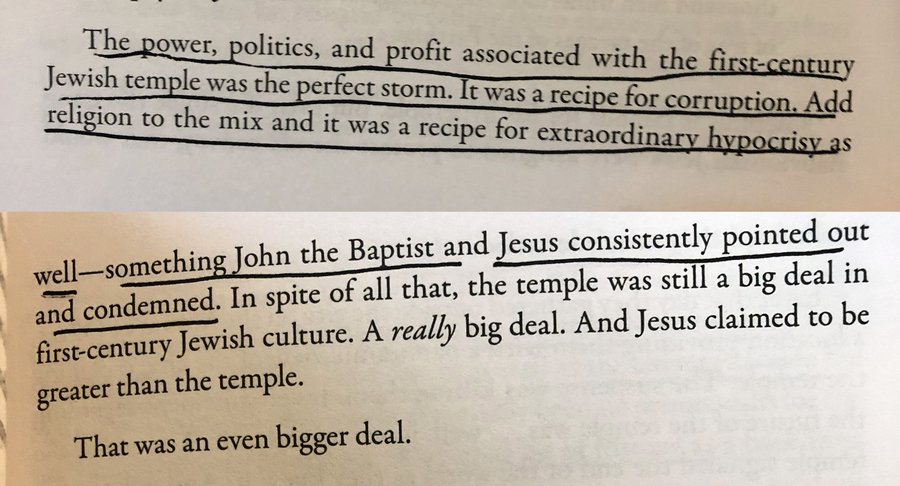
A significant and horrific event that followed Jesus' life by 40 years is detailed in a powerful way in the incredible chapter 5 (my favorite of the book). The destruction of the temple.
To Israel, the temple was a big deal, the center of Jewish life. And the new that Jesus was introducing about the temple (It's not necessary, and there is a better option) was deeply offensive and threatening to the religious leaders of the time.
To give it context, by the time Jesus arrived on the scene, the temple system was fully corrupt and profiting greatly. An elaborate system of coercing Jews to pay the temple tax was in full effect, with an army to protect the transportation of it. The vanity of religious leaders, the hypocrisy of their actions, and the neglect of the people was in high gear. Both John the Baptist and Jesus sharply contested this in their words and actions (How could you not love Jesus, even if you disagreed with who he was?).
While I was familiar with the highlights of the corrupt temple tax system and the pushback from Jesus, it wasn't until I read chapter 5 that I fully grasped the extent of the corruption problem.
Millions of Jewish men over twenty were required to pay a half days wages. The protection of this money as it was transported between cities was immense. Even after Rome passed a law forbidding the tax (because it pulled money out of their great cities), Jews continued to pay it. And a trade-in system was created at the temple to further exploit the people.
Sitting in this understanding adds an entirely different weight to the situation. We've got a powerful and financially profiting enterprise on one side, and a single man (?) on the other? It should have been a simple showdown with the temple easily and quickly dispersing the threat. But instead, it went the opposite direction. How did that happen?
Unimaginable.
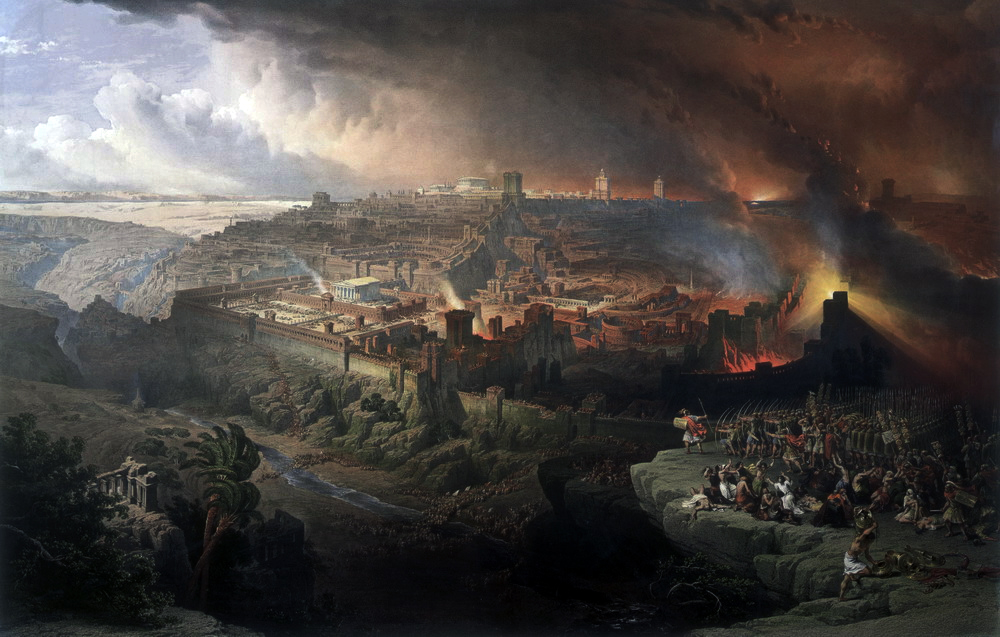
As Jesus and his disciples exited the temple on their visit, he looked back and said the following profound statement about the structure.
"Truly I tell you, not one stone here will be left on another; everyone will be thrown down."
Yeah, this was 40 years before the temple would be destroyed, and there was an elaborate protection and funding system in place for it. This didn't seem likely.
The disciples asked when that would happen. Jesus responded with "the most verifiable prophecies by anyone, anywhere, at any time" (so much so, some can't imagine it was actually said by Jesus before these events played out).
"When you see Jerusalem being surrounded by armies, you will know that its desolation is near. Then let those who are in Judea flee to the mountains, let those in the city get out, and let those in the country not enter the city."
Many of the stones found in the area are the remnant of the destroyed Jewish temple and the peak of the Judean War. Every stone was thrown down after thousands of Jewish rebels were trapped inside and eventually slaughtered or captured to be sold into slavery.
Josephus, a Jewish Historian wrote the following about the battle.
"The Slaughter within was even more dreadful than the spectacle from without. Men and Women, old and young, insurgents and priests, those who fought and those who entreated mercy, were hewn down in indiscriminate carnage... The legionaries had to clamber over heaps of dead to carry on the work of extermination."

What was also unexpected and unprecedented in the attack was how every stone "used in the construction of the temple was to be torn down, dragged to the edge of the plaza, and pushed into the valley below."
And many of these stones remain to this day, two thousand years later. But as tragic as this moment was for both the people involved and the temple, something greater than the temple had come.
The new was here.
Wrapping Up Section 1
Our walkthrough (and my commentary) of Section 1: Simply Resistible is complete. We've explored...
- Why Americans don't attend church.
- The flaws with modern day American Christianity.
- The unnecessary reasons people stop following Jesus.
- The astonishing origin story of Christianity & the lack of a naturalist explanation for the metaphorical explosion of the church.
- How God set the stage for something wonderful, and how the Church has significantly impacted the world.
- The importance, power, and corruption of the temple system when Jesus arrived on the scene.
- The unimaginable destruction of the temple and Jerusalem followed by the profound prophecy of events from Jesus 40 years beforehand.
Section 2 will explore all things new, including the new movement, agreement, and directives from Jesus that were profound and world-changing for the first-century church.
Section 2: All Things New, Introduction
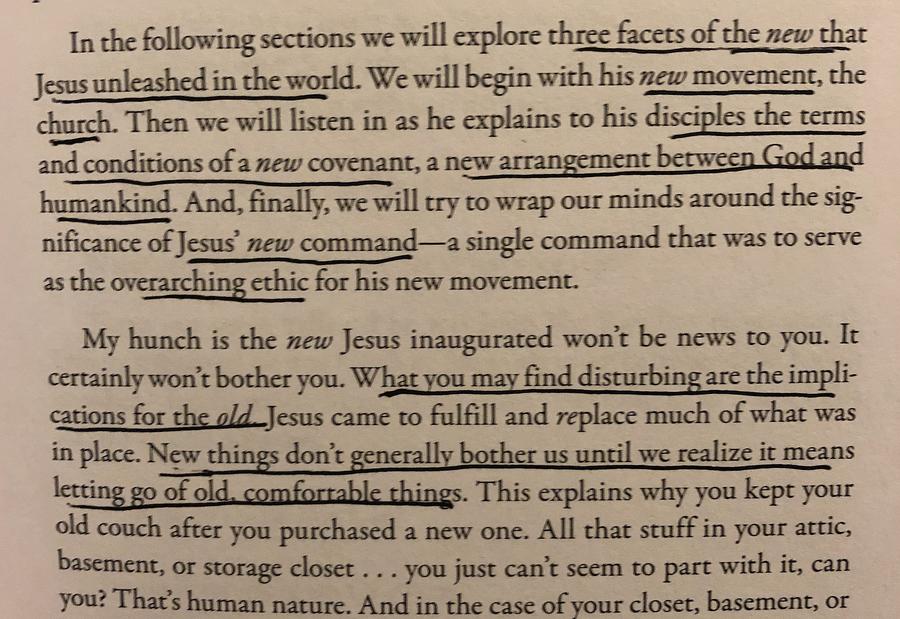
I recall a pivotal moment in my journey in 2013 when I recognized how complicated I was seeing and understanding Christianity. It's much simpler than we think, but there is an inordinate amount of history and complexity surrounding it, easily allowing us to get distracted or focus on the things of least (or no) importance.
What I also love about the core essence of Christianity is how it course corrects cross-generationally. As a child, I remember reading the new testament scriptures, while young, and also noticing contradictions between what it said and what I witnessed among the adults in (and out of) the church. While others simply left Christianity, my response was to adopt the good, shed the bad, and incorporate the new to me. The endgame was to become the Jesus we read about (an impossible feat on our own).
This same drive will be true for my children as each generation will make progress, and subsequent ones will carry the torch. This next generation of Jesus followers will have a strongly anchored foundation simplified on the elements that matter most (what we're exploring in this book). The unnecessary baggage will be shed in the fires of cultural challenge and worldwide change.
Chapter 6: Brand-New Movement
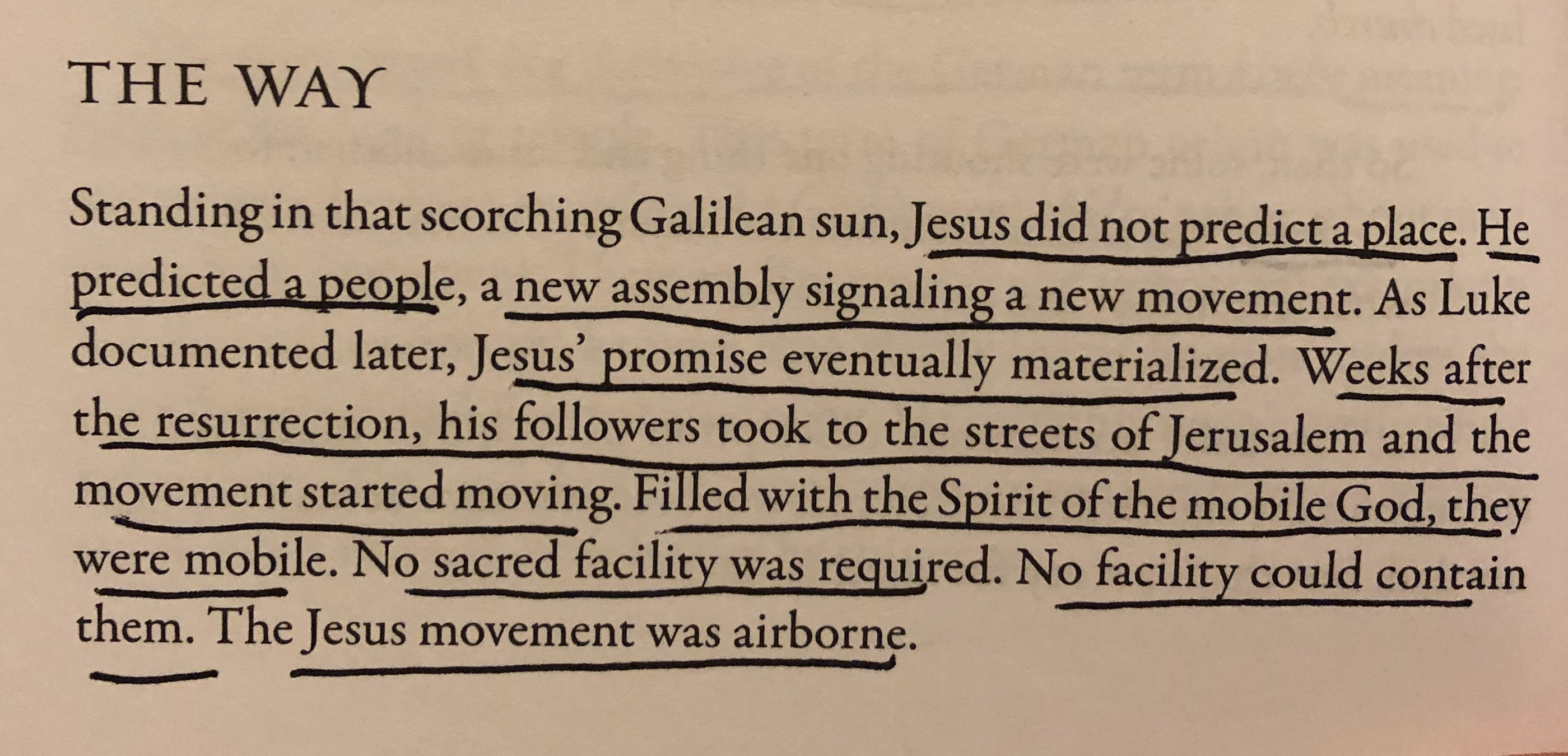
As often as we attempt to box in and contain what Jesus started, the life He modeled and freely gave will always break through the constraints placed on it (from both insiders and outsiders).
There is the local church building around the corner, but more importantly, is the movement of people that make up the Church worldwide.
Over two thousand years ago, something happened. And it began a brand new movement.
There's only one explanation that makes sense of all the facts. And it's the simplest one (although, it's not easy to accept).
Chapter 7: Brand-New Agreement
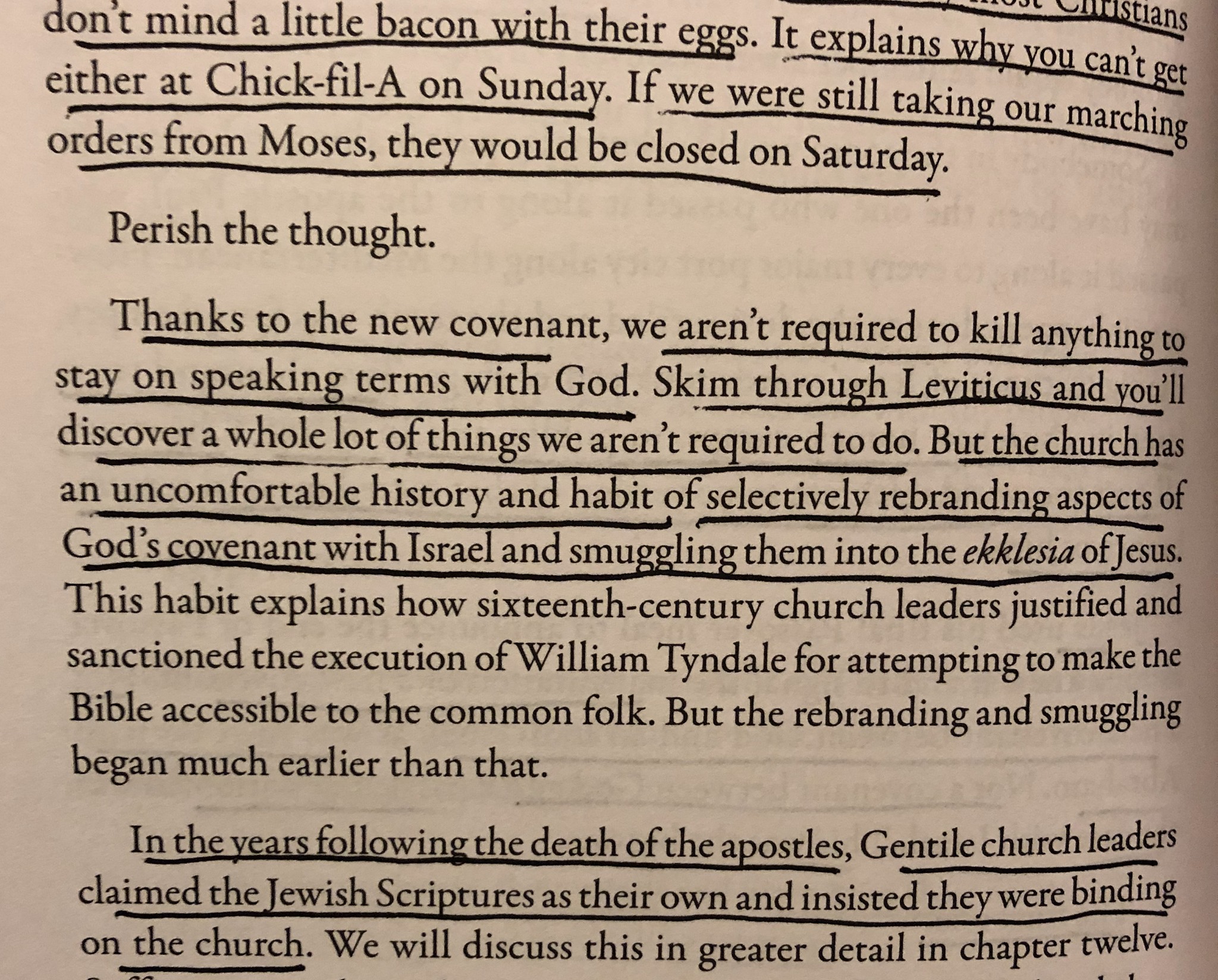
It's wonderful and freeing to embrace a Jesus centered perspective. To aspire to live as He did, and to view the scriptures from his perspective.
But, our tendency to want the black and white, carrot and stick, we find in the Hebrew Scriptures, sucks the life out of what Jesus came to bring. It had a purpose, it's just not ours.
These inspiring old testament stories and principles help us appreciate the story that came before, and the shoulders we are standing on, especially as we look at ourselves and the world around us.
The new way Jesus brought is more freeing, but it also comes with a higher call to responsibility.
Chapter 8 & 9: Your First Look At The Good Book & The Bible According To Jesus
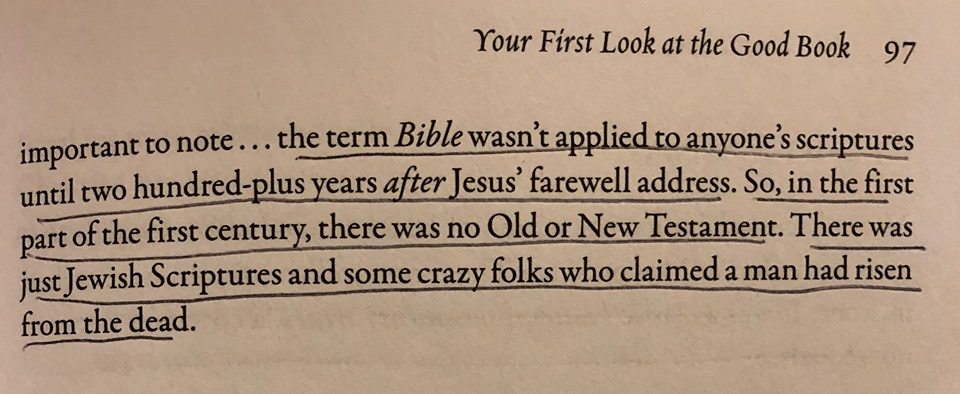
Did you know that Christianity existed before the Bible ever did? The Bible is the result of Christianity, not the other way around.
When it comes down to it, the critical question is, did Jesus actually resurrect from the dead physically? And, on the answer to this question, hinges all of Christianity.
If this isn't true then none of it is.
The following debate explores the truth of this claim. Click the play button below to watch.
Chapter 10: Homebodies
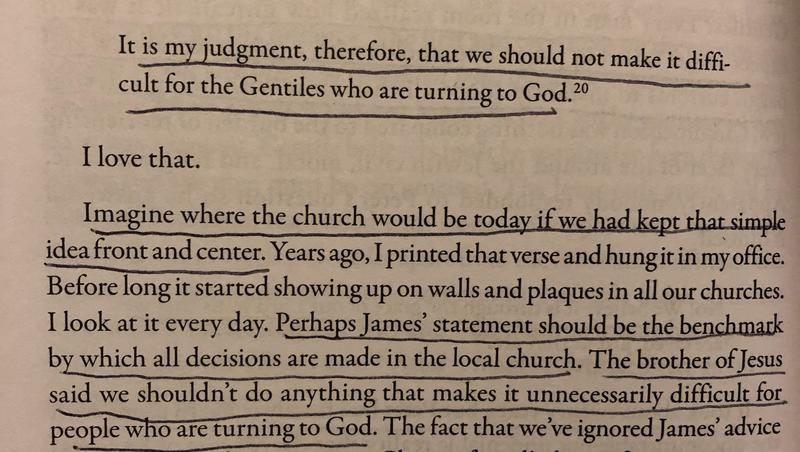
When Jesus first went to his disciples, he simply invited them to follow him. Simple, and something we followers over history have unnecessarily complicated.
There's a beauty in this simplicity.
Follow Jesus.
See what happens.
Not sure about the Bible? The Flood? Adam & Eve? Got hurt by the church? Wondering how to reconcile the death of a friend? Struggling to reconcile the suffering of people you care about? Been abused as a child?
Maybe following Jesus is the elusive answer you've been looking for. The life you want, but can't seem to find.
I suspect the many people who heard about this man of Nazareth at the time heard the rumors of who he was and the amazing things he did. I suspect they commonly asked, "who is Jesus?"
And perhaps, this is the best next question you could ask.
Chapter 11: The Apoplectic Apostle
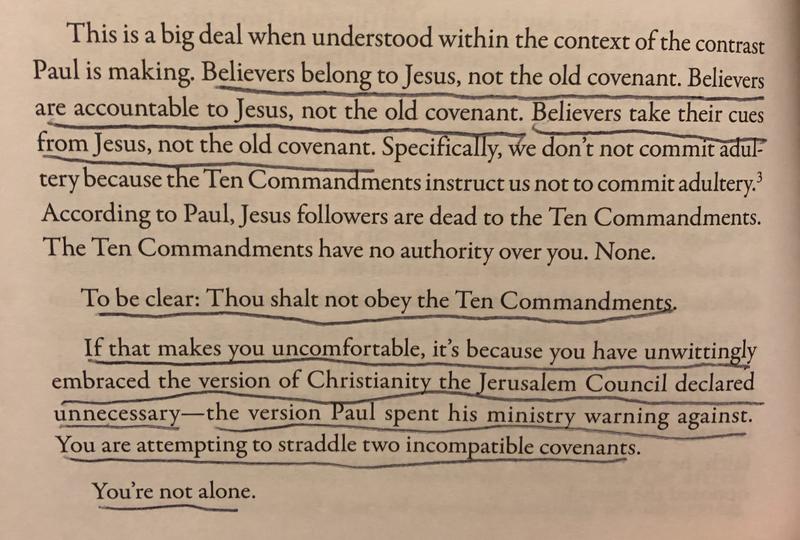
Wow.
What do you think about this?
It has me wondering, why are Christians so adamant about having the ten commandments displayed in public places? Why are we not calling for the sermon on the mount, the beatitudes, or other wonderful words of Jesus?
Not only would it more accurately reflect our Jesus centered beliefs, where they come from, and the underlying motivation, but I suspect we'd build more secular allies in our initiative to love others as Jesus has done for us?
Who can't get behind that?
So, what is it about the Old Testament that pulls us Christians into interpreting, adapting, and applying the Hebrew Scriptures in a directorial way for our walk with God today (as opposed to being a powerful backstory and inspirational example)?
The black and white clarity of the old testament may very well be preferred to the high expectation of Jesus (What does love require of us?). And much like the religious leaders of the time, many current Christians may be more interested in control than they are about what's best for people.
The law is designed to foster individual and collective flourishing, not to depress the marginalized, broken, and sick. When following the letter of the law at the cost of human life and dignity, it's a good time to look in the mirror and see what's going wrong.
Chapter 12: Obsolete-R Than Ever
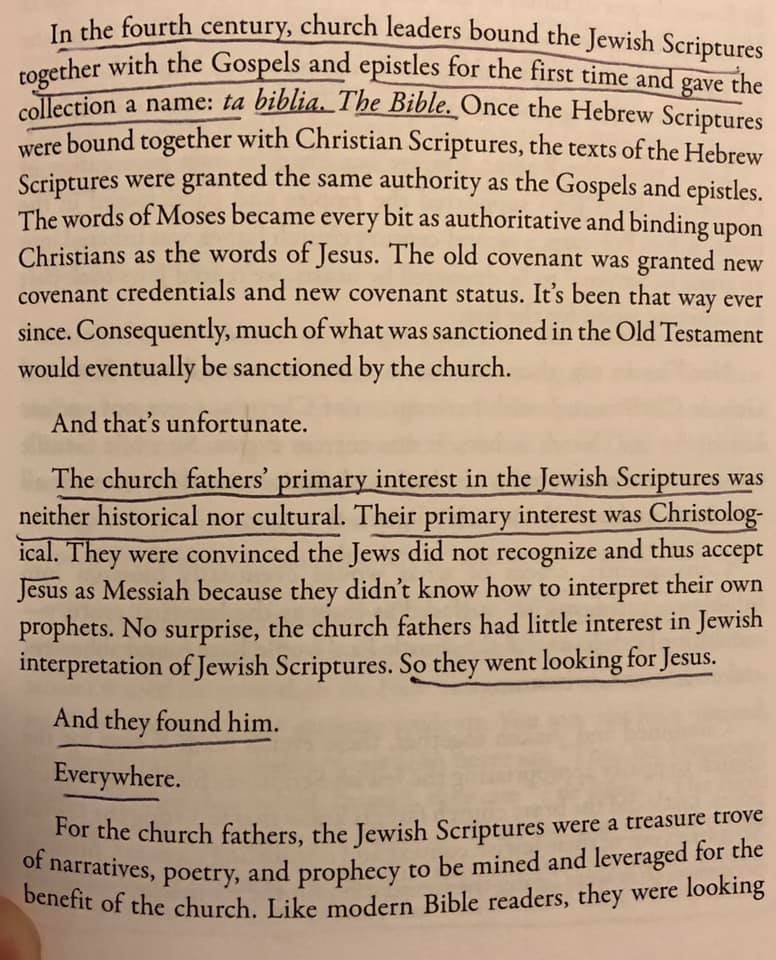
"But as it is, Christ has obtained a ministry that is as much more excellent than the old as the covenant he mediates is better since it is enacted on better promises. For if that first covenant had been faultless, there would have been no occasion to look for a second..." - Hebrews 8:6,7
"In speaking of a new covenant, he makes the first one obsolete. And what is becoming obsolete and growing old is ready to vanish away." - Hebrews 8:13
There was many Jesus followers and much church growth way before Christians ever had the Bible or the Old Testament. If the Old Testament is obsolete what is the purpose of the Old Testament? Why is part of our Bible?
The interest in these Jewish writings was founded on an interest in a Jewish man named Jesus. He, the Messiah, was found throughout these ancient scriptures. And, because Jesus looked at the laws and the prophets (old testament) with high regard, we follow his lead.
God would work with Israel to create the new covenant we all benefit from today. But somewhere along the way, we confused the authority and direction from Jesus and his followers with the ancient writings and details of an ancient covenant between God and a specific group of people.
As we see throughout the new testament letters, when we mix and match the old and new covenants, we cause an abundance of issues for ourselves and others.
The passage from Jesus about the wineskins comes to mind...
"And no one puts new wine into old wineskins. Otherwise, the wine will burst the skins, and the wine is lost as well as the skins. No, new wine is put into fresh wineskins.” - Jesus
Chapter 13: Our Old Friend
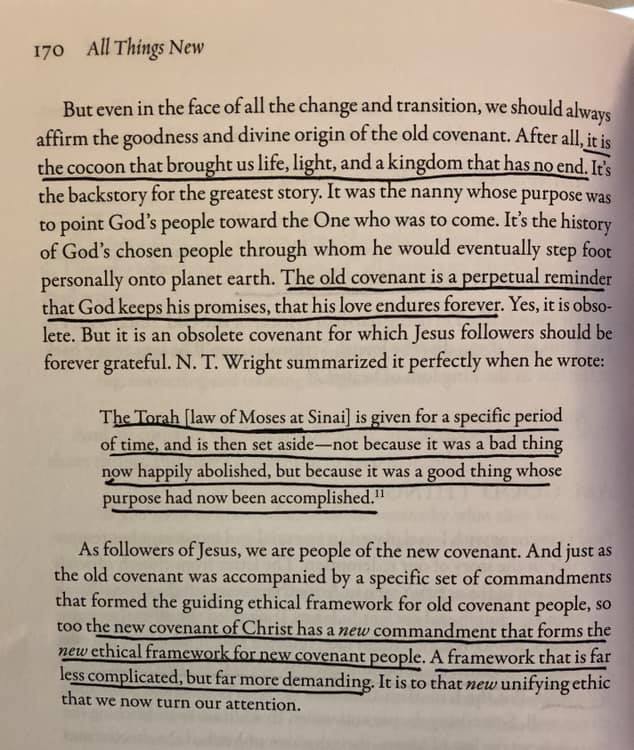
Understanding the place of the Old Testament inspires us and provides principles for us to extract. It also sheds the unnecessary weight of having to follow it (as was expected by the Israelites).
So as Christians, what is our covenant? How are we to live? The answers to these questions are explored in part 3.
Wrapping Up Section 2
- The prediction of Jesus' church, and its geographic independence.
- The uncomfortable history the church has with applying the old covenant.
- The history behind the creation of the Bible.
- The crux of which Christianity hinges.
- How we've made it difficult for people to follow Jesus.
- How Christians are not directed to follow the ten commandments.
- Why the Jewish Scriptures were included in our Bible.
- The place of the old covenant, and its role in the new.
In section 3, we'll explore a new ethic introduce and given by Jesus to his followers. He'd fulfill what came before and launch something brand new. What will love require of us?
While you wait for section 3, visit my page below to catch up and read my entire commentary on the book so far.
Section 3: A New Ethic, Introduction
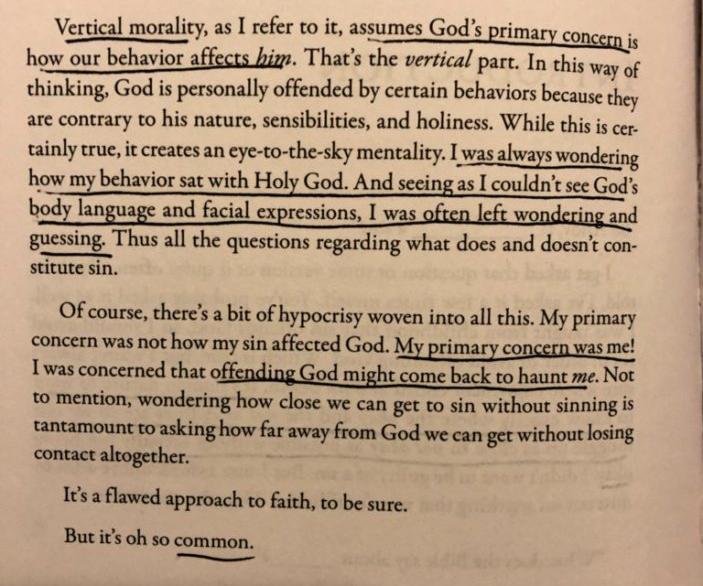
If we steam roll the people around us but are in "good standing" with God, have we missed the point? Is our primary motivation of not sinning driven out of personal motivations (To not be punished by God, or to be rewarded for our good behavior) instead of the intrinsic value it provides to people?
When Jesus arrived on the scene it quickly became clear that how we treated each other is of utmost importance to God. Love God, but also "love others as we love ourselves". He elevated the standard beyond simply a transaction (the carrot and stick of the old testament), but towards a love that would think and act towards others in a way that would benefit them. And often at the cost of our own comfort, preference, or safety. A higher standard with little wiggle room to get out of loving others.
Instead of asking whether an idea or action is a sin (sin avoidance), what if we instead asked how we could demonstrate the love of God through whatever situation we're facing? With whoever is involved? Jesus, the disciples, and Paul lean into this idea as they collectively explore and share ideas on how we can effectively love others as God (through Christ) loved us in a variety of scenarios. And this sets the stage for the ideas we'll explore in part 3.
Chapter 14: Trending Horizontal
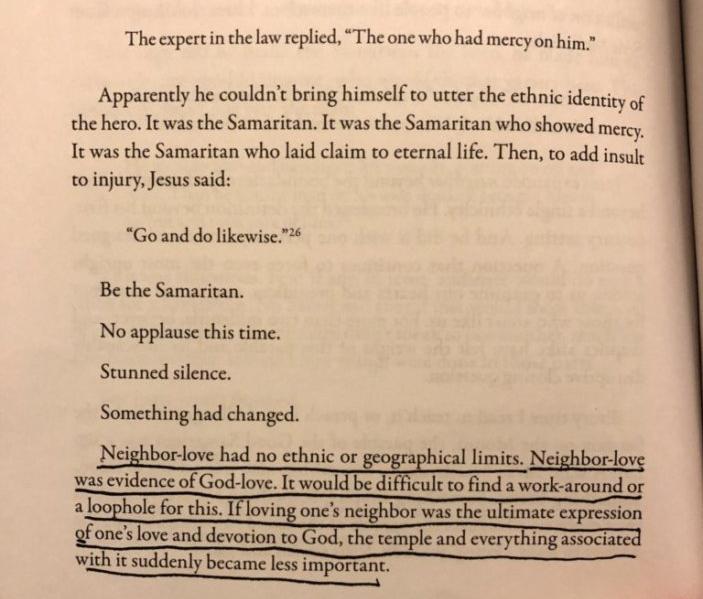
If you've heard the parable of the Good Samaritan, you're familiar with the story of someone in need while people you'd think would help him passed by this downtrodden man (also considered an outcast or enemy to them).
Tribalism pushes us to help those IN our group. Jesus directs us to also help those OUTSIDE it.
As high is this standard is, it’s not striving towards it that allows us to attain it but rather the appreciation and experience of receiving this type of love from God that empowers us to live it out with others.
Chapter 15 & 16 - A New Command + Paul And The Irresistible Ethic
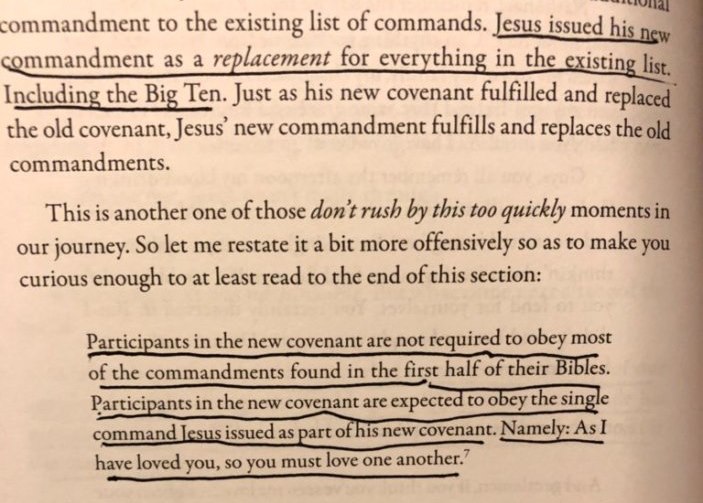
“Love others as God through Christ loved us.”
The life of Jesus gives us the model on which we Christians are to mimic. His character, words, and actions are the example that reveals how we are to understand love.
But it’s not just His model that empowers us, it’s how God demonstrated his love to us (while Jesus was on the earth and in our individual lives) that moves us. By receiving His love in a personal way, we’re continually equipped to effectively love others (if we choose to embrace it).
- Jesus prioritizes us, so we put others first.
- Jesus fills us up so we fill up others.
- Jesus comforts us when we need it so we comfort others when they’re hurting.
- Jesus confronts corruption so we do the same.
- Jesus forgives us so we to the same with others.
- Jesus sacrificed for us, so we sacrifice for others.
As Christians, we pay God’s very real love forward, because the visceral impact his love has had on us.
How much of God’s love have you known, felt, and experienced? And how much have you leaned into living as a conduit of this love towards others?
Chapter 17 - It's Mutual
The unexpected explosion of Christianity that started with Jesus’ resurrection was perpetuated by the irresistible love for one another by the early church. Their actions were a compelling argument that what they said happened with Jesus actually happened.
We Christians individually and collectively are a light in a dark hopeless world. But currently, in America, the church has a checkered reputation. In many ways, the greatest obstacle we Christians place between people and Jesus is ourselves.
“I like your Christ, I do not like your Christians. Your Christians are so unlike your Christ.” - Mahatma Gandhi
Ideally, people spend the time to discover the truth (despite poor Christian examples), but we can't expect everyone will push past their negative experiences with Christianity to get there. We ought to push through to them as God has done for us.
You and I have an opportunity to be a contrasting anomaly to these people as we share the love of Jesus with them in real and meaningful ways.
Chapter 18: Don't Even Think About It
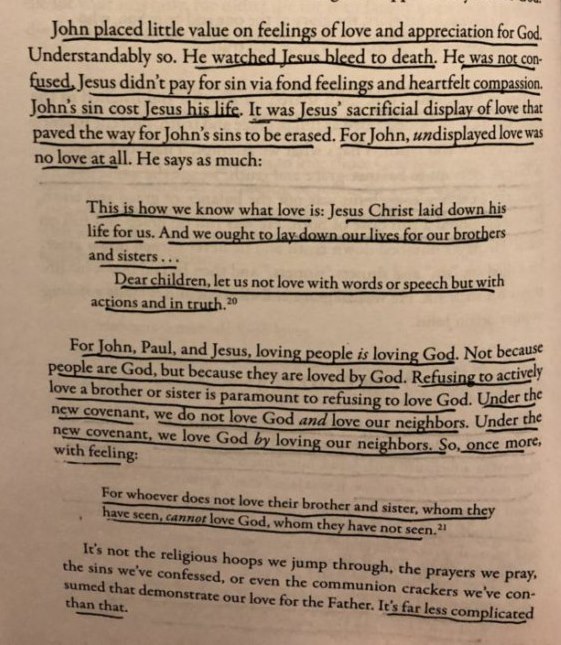
"For whoever does not love their brother and sister, whom they have seen, cannot love God, whom they have not seen." - John the Apostle
We cannot love God when at the same time choose to withhold love (or exert malice) with the people in our lives.
It's a simple directive, but when things are heated, we're hurt, or circumstances are rough, it's not so easy. And John goes as far as to say our words and speech are not enough.
How do truth and action (as you love others) unfold in your life?
Chapter 19: A Better Question
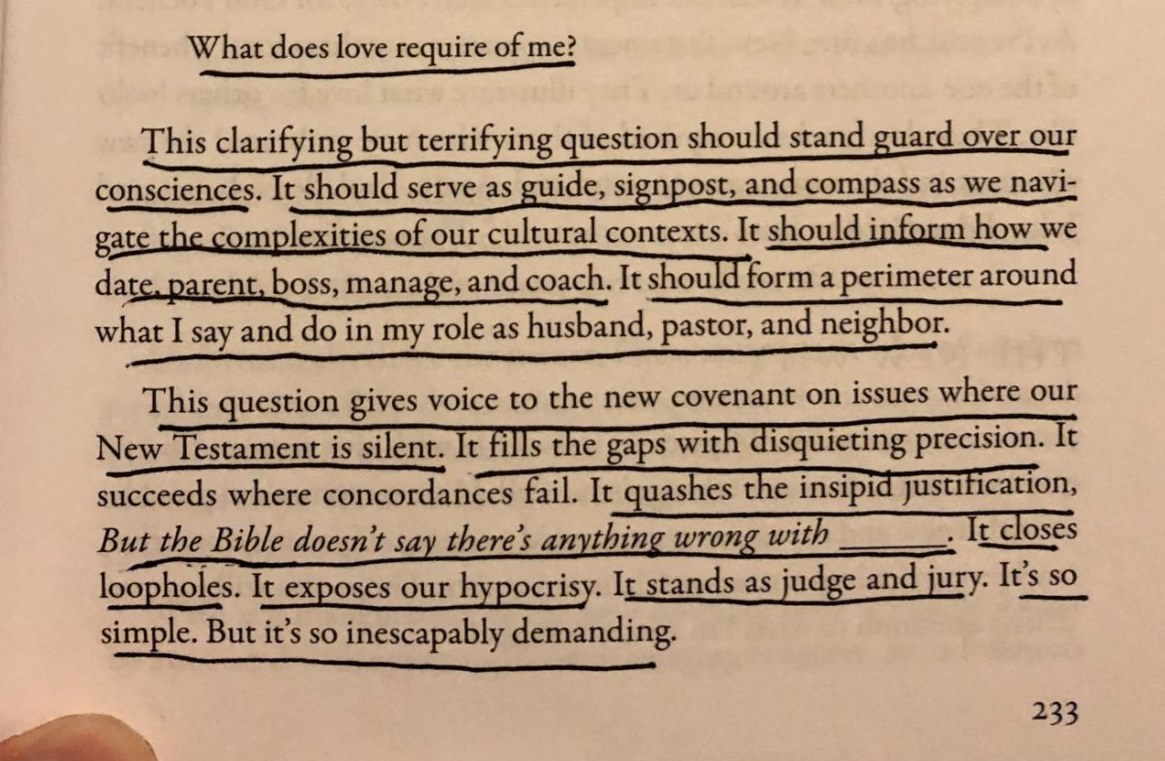
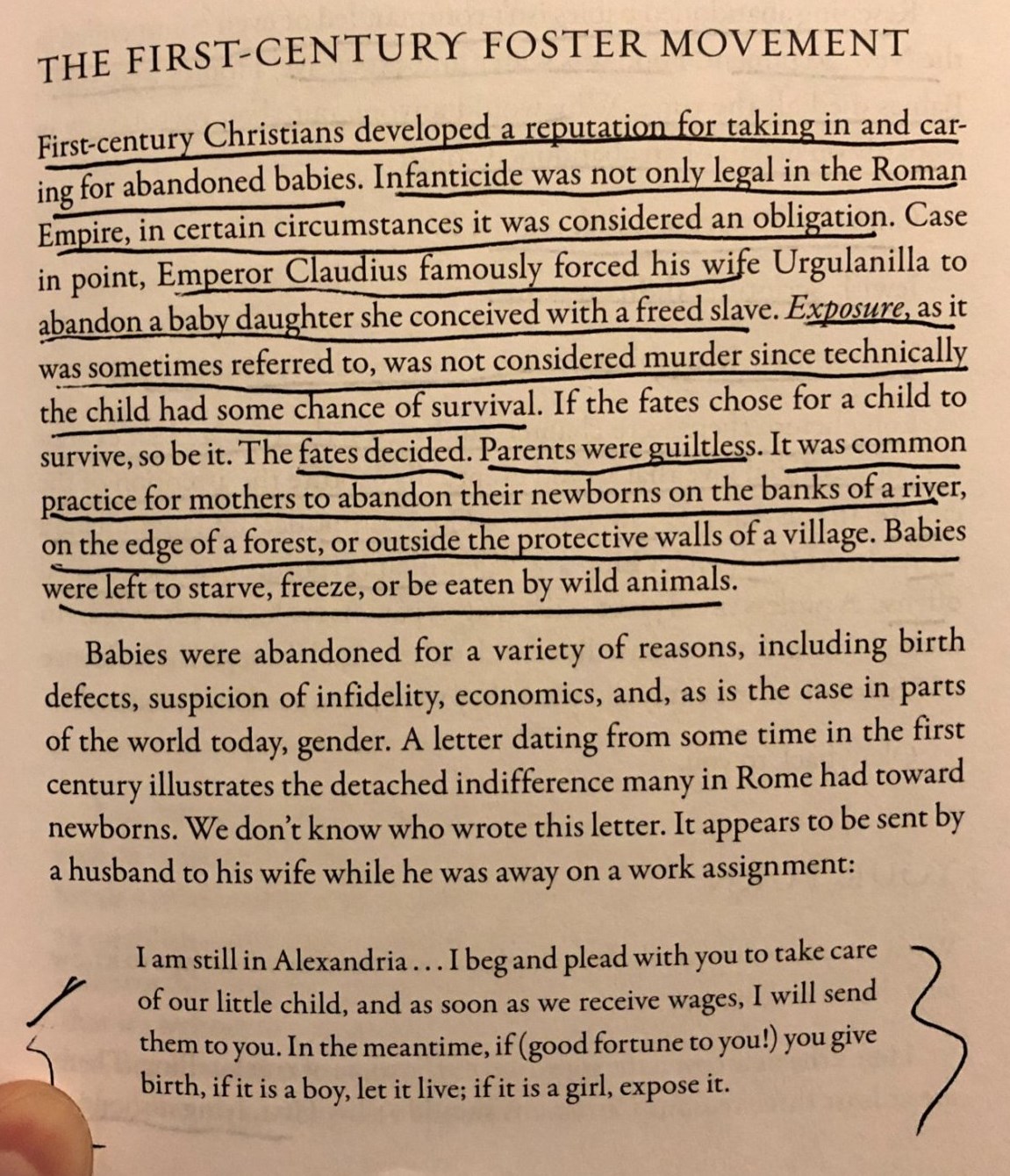
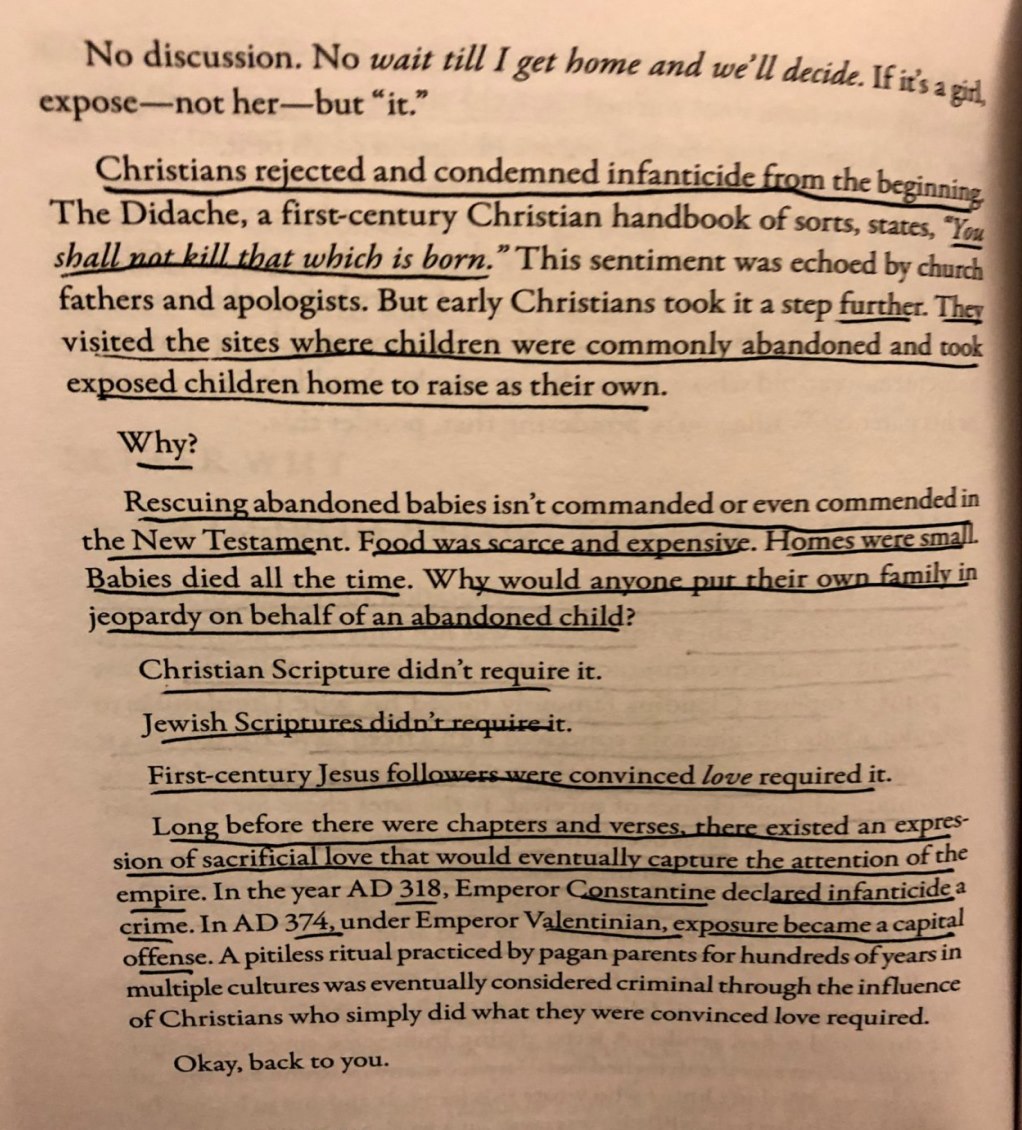
"What does love require of me?"
It's inspiring to read the stories of how the early church responded to this question with loving action. When I see how they responded to infanticide in the Roman Empire, by simply leaning in and saving lives, I'm compelled to follow suit. And they didn't do it because of some commandment or rule, they did it because the children were valuable (even when not valued by the government/community) and being left to die. In their most vulnerable state, Christians stood in the gap for these abandoned children by saving their lives.
Imagine how we could change our family, our community, and our country if we simply leaned into this question as we faced the challenges all around us?
Led by the example of Jesus and the early church we're given numerous examples of this irresistible faith that changed the world. And, it's a faith that will change our world too.
Chapter 20: What Love Required Of Me
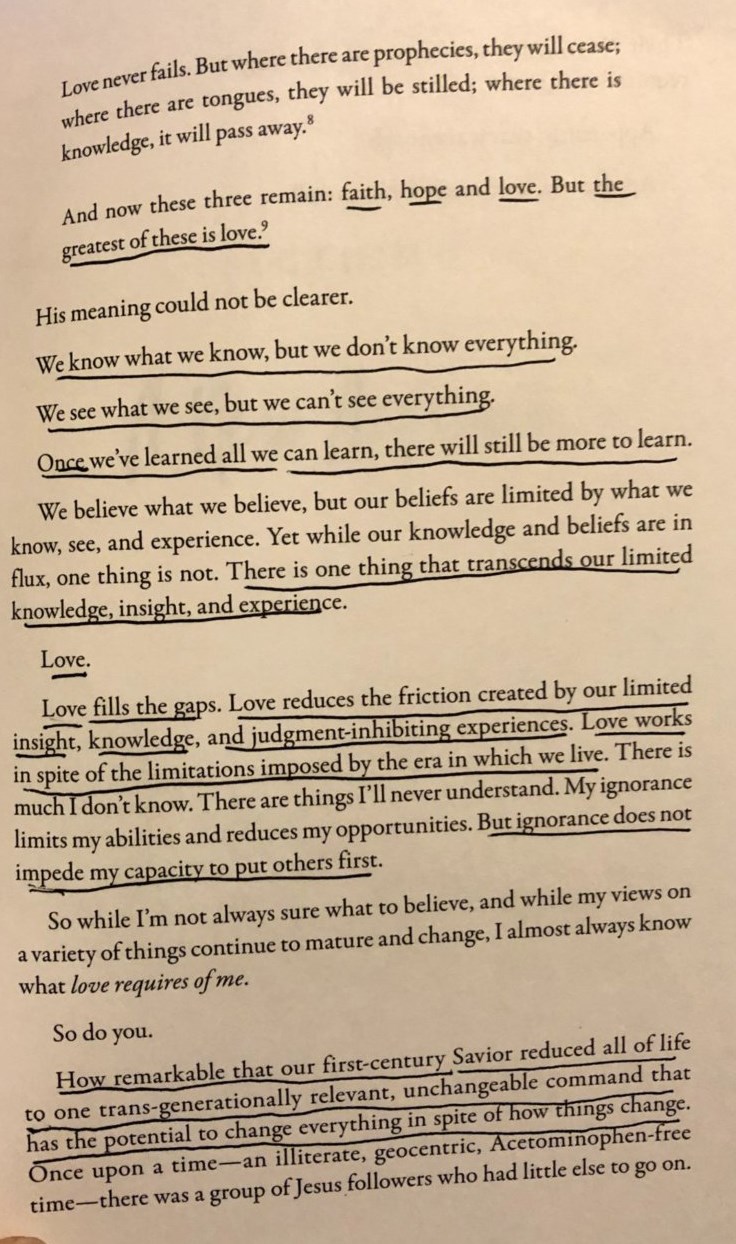
"Love never dies. Inspired speech will be over some day; praying in tongues will end; understanding will reach its limit... Trust steadily in God, hope unswervingly, love extravagantly. And the best of the three is love." - Paul The Apostle
Love pushes us beyond just ourself. We're to serve and love others in remarkable ways because God has done so for us. The life he gave us, the sacrifice he made for us expresses this to us.
That which is timeless and transcends all other things is threefold (faith, hope, and love). But love goes beyond the other two.
What impacted me most is love poured out to me. The love I received as a child from my parents and community, the care during the tough times later on, and time dedication by those who could have done many other things with their time.
Those without love or neglected are severely disadvantaged, but we have the opportunity to fill in the gap. Love is powerful and goes to guarded, dark, and unreachable places.
As Christians, let us be most known for how well we love people. And let this love be a compelling reason for them to explore the source of that love.
Wrapping Up Section Three
Here's what we've explored in part three.
-
Our goal as Christians is not sin avoidance, but rather pursuing Jesus and expressing His love through us.
-
God cares a great deal about how we treat our fellow man. And how we love people is an expression of how much we love God.
-
Jesus' final and overarching command to us Christians is, "As I have loved you, so you must love one another." This should guide everything we think, say, and do.
-
"We don't love because the Bible tells us to love. We love because God the Father through Christ loved us."
-
We imagine a world where people may question what we believe, but are drawn to the way in which we treat others.
-
Love is done with Action and Truth.
-
"What does love require of me?" is our question for exploring how we proact and respond along the Christian journey. It won’t always be easy and we’ll stumble along the way, but we’ll steadily move forward.
-
Love will require a great deal from us, but it will impact and transform lives in powerful ways.
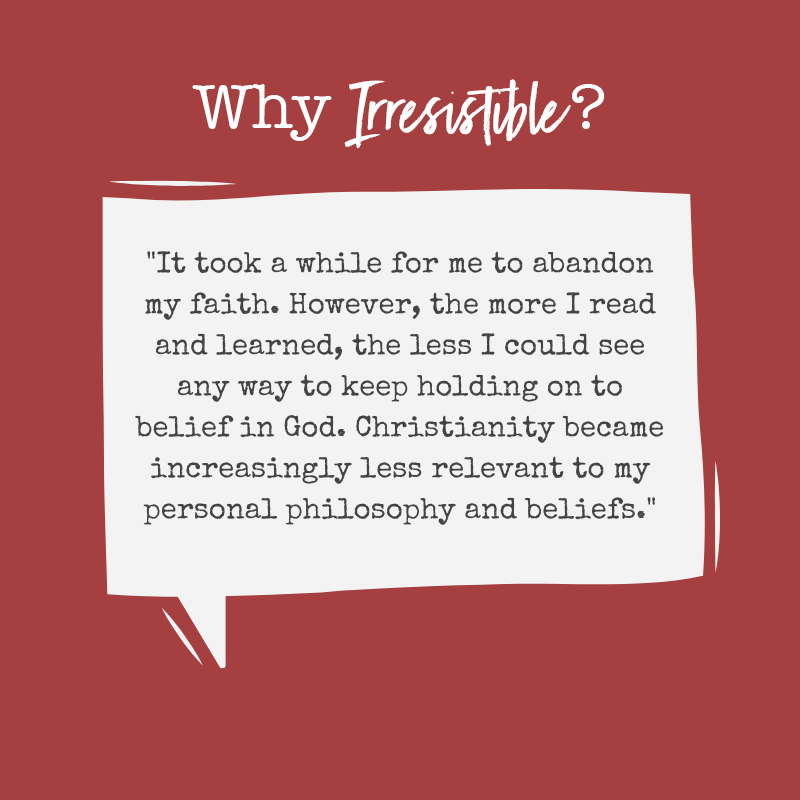
Part 4: A New Approach
"Many, perhaps most, folks who've walked away from faith walked away for reasons that had virtually nothing to do with the new Jesus introduced." - Andy Stanley
In this final section of the book, Andy gets to the heart of the matter with why he wrote this book and the importance of adapting our approach to the shifting cultural context. People are walking away from Christianity not because they're leaving authentic Christianity, but because they've responded to a counterfeit, elementary, or incomplete version of Christianity.
Unfortunately for many, they walked away unnecessarily when the challenges they faced in the real world were too much for their faith to withstand. But there is good news. The foundation of our faith as Christians is strong and profound. And when embraced, transformative. What if they leaned into the original version?
Chapter 21: Dorothy Was Right

As part of growing up, our beliefs are challenged by the people and around us and the circumstances we face (This is often an important and fruitful process). Even us Christians move on from the elementary version of Christianity we grew up with (as its no longer tenable). The depth and challenges of life almost force us to let go of our way and go deeper, somewhere. But, for some former Christians, they walk away from a version of Christianity that didn't hold up (or was not good), and often justifiably. Many of us would have done the same in their shoes.
For Christians who retain their faith through this process and have something solid and good to hold onto, the following quote by CS Lewis comes to mind.
“My idea of God is not a divine idea. It has to be shattered time after time. He shatters it Himself. He is the great iconoclast. Could we not almost say that this shattering is one of the marks of His presence?” ~C.S. Lewis (A Grief Observed, p. 66).
Our version of God and Christianity will be shattered. How will you respond when that happens?

And those challenges, more loudly and widely found in the last few decades, are coming fast and furious. While this is nothing new, the turn of the millennia and the events of 9/11 have changed things for Christians in America.
The good news is how it's created focus and clarity around the foundation, origin, and mission of Christianity (which had become bloated and problematic in many ways). While change and transformation are not fun and often uninvited, this uncomfortable change is good news for Christianity, the church, and future generations.
Going forward, Christians will be required to not just believe, but understand who they are as believers, what they stand for (and upon its foundation), as well as how to effectively communicate the good news (through words, and more importantly, action).
Chapter 22: Name Callers
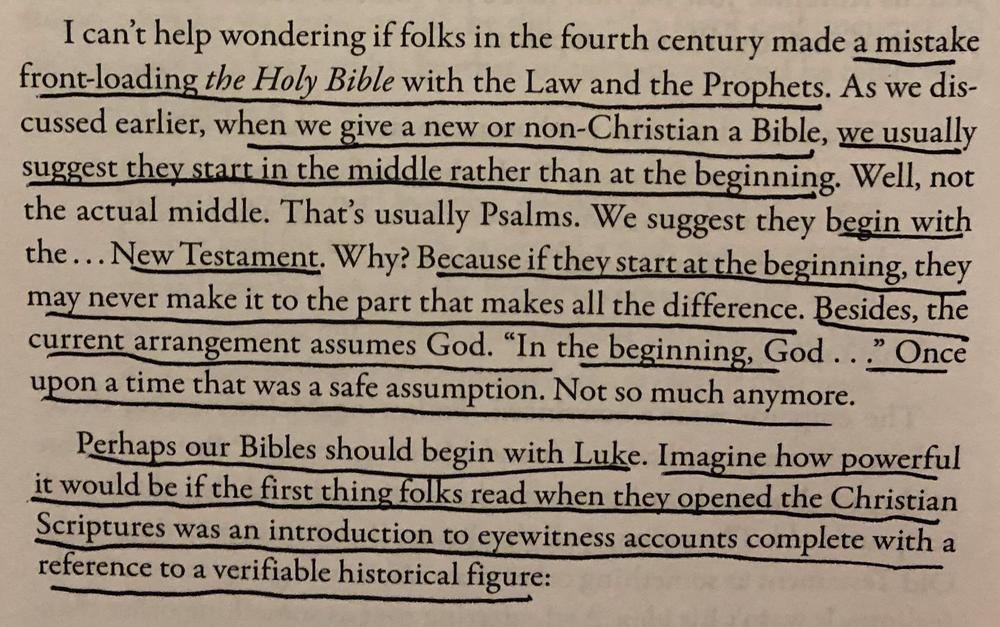
"Many people have set out to write accounts about the events that have been fulfilled among us. They used the eyewitness reports circulating among us from the early disciples. Having carefully investigated everything from the beginning, I also have decided to write an accurate account for you, most honorable Theophilus, so you can be certain of the truth of everything you were taught." - Luke the Evangelist
Imagine if our Bibles started with the preceding passage.
Perhaps we Christians ought to change the order of our Bible's contents, as Stanley suggests. When I recommend how others ought to read the Bible, I don't tell them to start with Genesis.
Starting with Luke, who investigated the accounts would be a wonderful introduction to the Bible and to Jesus himself. The book of Acts, also written by Luke, would provide a meaningful account of the early church. These two books would wonderfully introduce people to Jesus and Christianity.
Perhaps this approach would diminish the confusion and contextualize the old testament in a more helpful way. What do you think?
"One of the things that really affected me was the writing of Luke. He's reporting, writing these things down after investigating them, so we can know the certainty of the things we've been taught. He keeps this line of thinking going, not flourishing or fantastical in his reporting. And it hit me that these guys were just reporting what they saw and his writings really impacted me as to the message and truth of what they were saying." - Former atheist Mary Jo Sharp, author of Why I Still Believe interviewed on Unbelievable Radio
Chapter 23 & 24: First Things First & The Bible Says
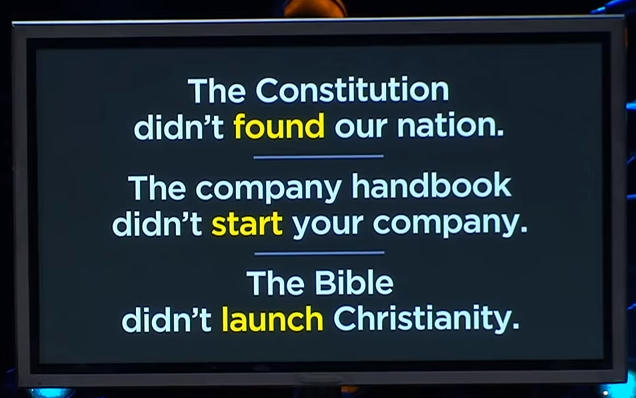
Asserting the authority of the Bible to skeptics and unbelievers doesn't hold the weight it did. But since our faith is not formed and founded on the Bible, we don't need to defend it. Instead, we Christians stake our flag in the ground on the life, death, and resurrection of Jesus. The collection of writings, that eventually became the New Testament, were the result of what happened (the event of the resurrection). The Hebrew Bible was later attached because of the interest in the Jewish Man, Jesus.
What I find interesting about Stanley's recommendation of referencing the New Testament sources when talking about them is how it flips the paradigm for explaining the foundation of Christianity's truth claim. When our faith is founded on the Bible, all of it must be true, for the claim of Jesus' resurrection to be true. When our faith is founded on the event of the resurrection, each individual piece of evidence must be explained in a way that discounts or dismisses the resurrection conclusion. And as easy as it might be to find "a problem" in "The Bible", the strength of the historical evidence is quite profound. The best arguments against the resurrection that I've seen are poor arguments (go explore them to find out).
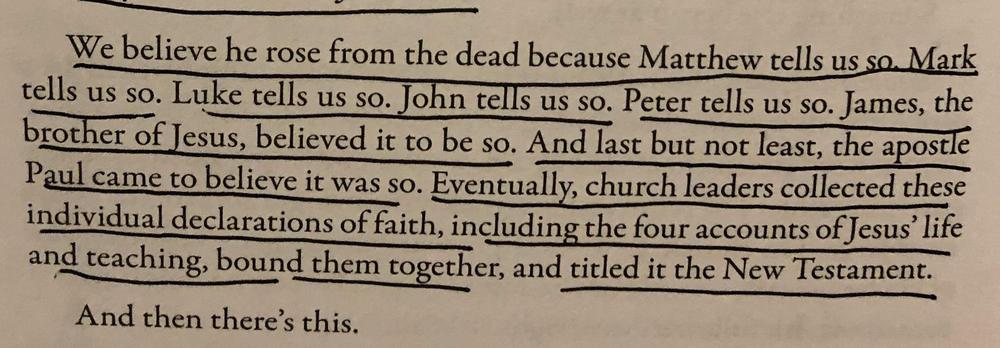
Chapter 25: History Worth Repeating
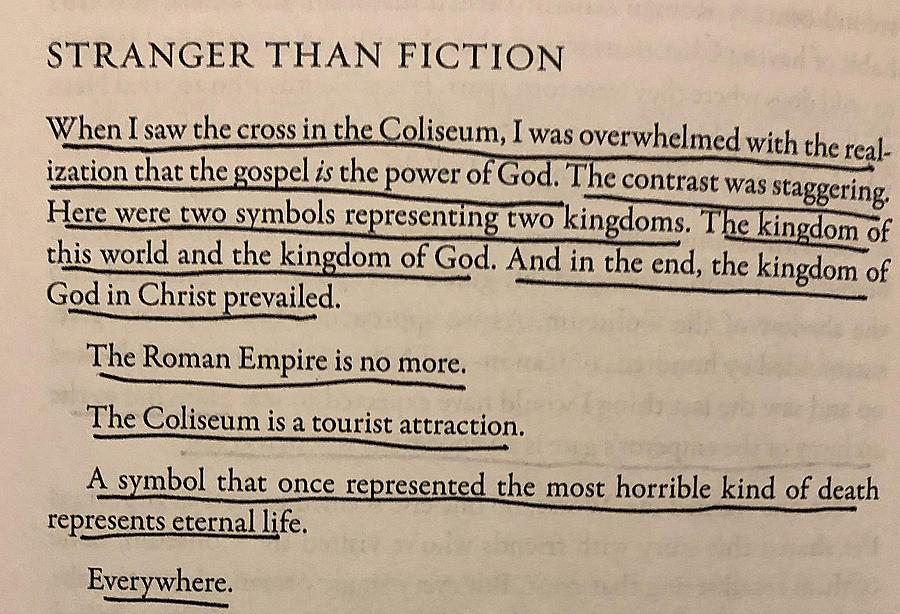
In retrospect, the result of Christianity's spread was unexpected. A pinnacle of human power decayed and the good news of Jesus prevailed. Amazing.
This final chapter in the book where Andy Stanley describes his reaction visiting Rome illuminates just how authentic and powerful the resurrection of Jesus was for all humanity, and more specifically for the early church which endured trials and tribulations that should have crushed it early and thoroughly, but didn't. Why? And, How? Questions that are not easily answered, except for the simplest explanation.
And for me, it wasn't just the good news that I heard which sustained me and my faith through the most difficult life challenges, it was the good news lived out and modeled by my family and community. This is the Kingdom we get to participate in and live out for others without hope, lost, confused and surviving in isolation. It makes a difference today, tomorrow, and for all eternity. Let's respond accordingly.
Additional Resources To Explore
- Click here to buy Stanley's book on Amazon (Affiliate link)
- Video: Reclaiming Irresistible by Andy Stanley
- Video Debate: Andy Stanley vs Jeff Durbin - Unhitching Christianity from the Old Testament?
- Video: How To Read The Bible - The Law (from the Bible Project)
- Written Debate: Irresistible Dialogue: Andy Stanley and J.D. Greear
- Podcast Episodes by Capturing Christianity: The Historical Case for the Resurrection of Jesus
- Video: Andy Stanley Talking About This New Approach at Catalyst 2019
- Ted Talk: I grew up in the Westboro Baptist Church. Here's why I left | Megan Phelps-Roper
- Article: Andy Stanley: Jesus Ended the Old Covenant Once and for All
- Video Series: Christmas. It's All Good. (By Andy Stanley)
- Created on .
- Last updated on .